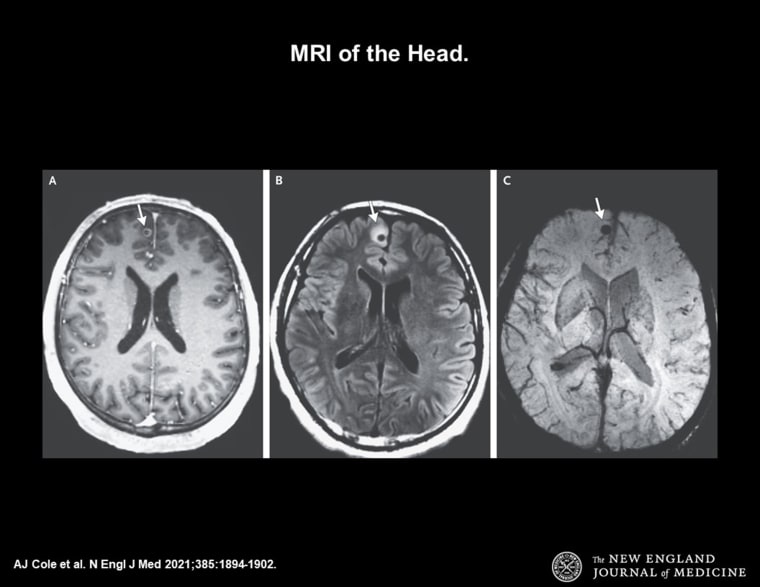He’d been perfectly healthy just the night before, but out of the blue, the 38-year-old Boston man was in trouble.
His wife reported that he fell out of bed at 4 a.m. and was on the floor “shaking,” confused and “speaking gibberish.”
When emergency medical personnel arrived at the home, the man was combative, disoriented and “actively resisted being placed in the ambulance.”
On arrival at Massachusetts General Hospital, he suffered a seizure and didn’t respond to questions or follow commands.
It was the beginning of a medical mystery that was finally solved when scans revealed a parasite in his brain that may have been there for years, doctors wrote this month in a striking case report in The New England Journal of Medicine.
After producing no symptoms for possibly decades, the parasitic brain infection suddenly disrupted his life with dizzying speed.
Just the day before, the unnamed man had been taking care of his children and had eaten dinner with his brother, displaying no unusual behavior, doctors wrote. He’d been taking no medications, had no signs of an underlying disease and had no history of any disorders. He rarely drank alcohol and didn’t use drugs.
But now, CT and MRI scans of his head showed three lesions in his brain, leading doctors to diagnose the man with neurocysticercosis — a preventable infection from a pork tapeworm known as Taenia solium.

It’s a leading cause of adult onset epilepsy worldwide, according to the Centers for Disease Control and Prevention.
The disease is common in parts of Asia and Central America, so another key clue was that the man had immigrated to Boston from a rural area of Guatemala about 20 years ago. But the disease is also “highly prevalent” in parts of the U.S., including California, Texas and New York City, the case report noted. Other states where cases are most frequently reported include Oregon and Illinois, the CDC said.
More than 2,000 people are hospitalized with neurocysticercosis in the U.S. every year and most patients have traveled to the U.S. from developing countries where the tapeworm is common, according to the Infectious Diseases Society of America.
The infection happens when people swallow microscopic tapeworm eggs. The process is not a pretty picture.
A food service worker might eat undercooked pork that has tapeworm larva inside of it. That tapeworm develops into an adult inside his colon and starts shedding eggs inside his feces. If that worker goes to the bathroom and doesn’t wash his hands, he will have the eggs on his fingers.
If he then handles food that’s raw or not thoroughly cooked, like salad, a person can swallow a tapeworm egg, which can travel anywhere in the body, including the brain.
The eggs containing larva form cysts, but infected people can remain asymptomatic for many years until they ultimately suffer symptoms such as severe headache, blindness, convulsions and epileptic seizures, the World Health Organization warned. The disease can be fatal, but it’s uncommon in the U.S.
“It’s so rare in the United States that you really don’t have to take any sort of precautions. It’s like once in a blue moon,” Dr. Jonathan Rasouli, a neurosurgeon in New York, told TODAY when commenting about another case of neurocysticercosis.
When traveling, he urged people to make sure any raw fruits and vegetables they eat are washed very well, especially in countries where neurocysticercosis is endemic. The highest rates of infection are in parts of Latin America, Asia and Africa that have poor sanitation and free-ranging pigs, the CDC noted.
As for the man in the case study, he received anti-parasitic medication for two weeks and was discharged from the hospital after five days when his neurologic exam was normal. It’s now been three years since that frightening incident. He continues to take medication to control seizures and remains seizure-free.

